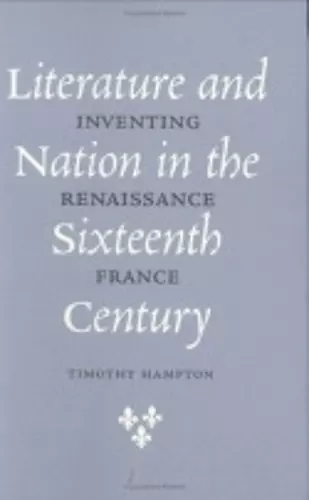Literature and Nation in the Sixteenth Century
Inventing Renaissance France
Format:Hardback
Publisher:Cornell University Press
Currently unavailable, and unfortunately no date known when it will be back

Assessing the relationship between the emergence of modern French literary culture and the ideological debates that marked Renaissance France, Timothy Hampton explores the role of literary form in shaping national identity.
The foundational texts of modern French literature were produced during a period of unprecedented struggle over the meaning of community. In the face of religious heresy, political threats from abroad, and new forms of cultural diversity, Renaissance French culture confronted, in new and urgent ways, the question of what it means to be "French." Hampton shows how conflicts between different concepts of community were mediated symbolically through the genesis of new literary forms. Hampton's analysis of works by Rabelais, Montaigne, Du Bellay, and Marguerite de Navarre, as well as writings by lesser-known poets, pamphleteers, and political philosophers, shows that the vulnerability of France and the instability of French identity were pervasive cultural themes during this period.
Contemporary scholarship on nation-building in early modern Europe has emphasized the importance of centralized power and the rise of absolute monarchy. Hampton offers a counterargument, demonstrating that both community and national identity in Renaissance France were defined through a dialogic relationship to that which was not French—to the foreigner, the stranger, the intruder from abroad. He provides both a methodological challenge to traditional cultural history and a new consideration of the role of literature in the definition of the nation.
Here is a historian scrutinizing literature, drawing out linguistic transformations and distortions and explicating them via politics. It is a remarkable achievement, offering many excellent analyses of which perhaps the most compelling is Montaigne's retelling of the first encounter of Spaniards and Americans.... This quality of reading and writing is found everywhere in Hampton's book.
-- Margaret M. McGowan * Times Literary Supplement *Through avid research, close reading and fine writing he gives us a wonderful book on the emergence of French nationhood in The Renaissance: Literature and Nation in the Sixteenth Century: Inventing Renaissance France.... For once modern concerns about politics and empire, etc., do not produce anachronistic or skewed readings of the past but underline continuities and comparisons. There is also in this complex but readable text an excellent discussion of that old standby of authors and critics, the difference between appearance and reality.
* Bibliotheque d'Humanisme et Renaissance *Displaying exceptional clarity and originality, Timothy Hampton's book is a superb addition not only to the expanding field of nation-building in early modern Europe, but also the fields of ethics and literature concerned with the question of alterity.
-- Zahi Zalloua, Princeton University * French Review *Hampton's new book unearths a whole series of complicated problems that lie buried in what are admittedly much studied, if non canonical literary texts of the French Renaissance.... This is a very interesting study that should appeal broadly to specialists in any number of fields.
-- Michael Wolf, Pennsylvania State University * Sixteenth Century Journ- Winner of Winner of the 2000 Aldo and Jeanne Scaglione Prize.
ISBN: 9780801437748
Dimensions: 229mm x 152mm x 27mm
Weight: 907g
320 pages